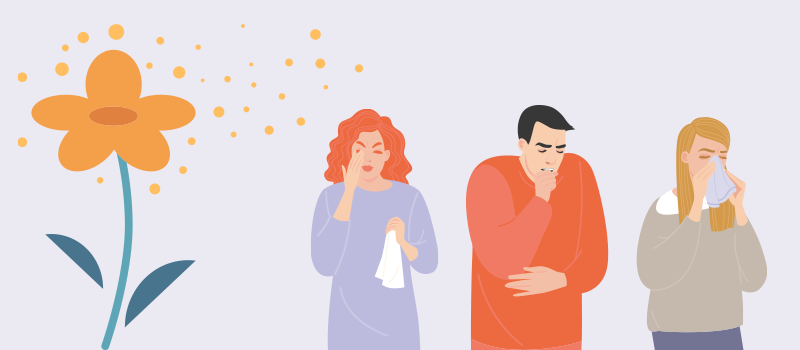What’s the Buzz
The Bee Healthy Blog
Best Nasal Spray for Spring Allergies

If you suffer from allergic rhinitis caused by seasonal allergies, commonly referred to as hay fever or spring allergies, allergy season can be tough when pollen counts are high. Allergic rhinitis is characterized by symptoms of sneezing, runny, itchy nose, nasal congestion, itchy eye, watery eye, and post-nasal drip. These symptoms are bothersome and can affect your quality of life. Fortunately, many medications can give you relief from allergy symptoms. Compared with oral allergy medications, nasal sprays act locally and provide faster symptom relief for nasal symptoms such as runny, itchy nose and sneezing. Please keep reading to learn which type of nasal spray is best for spring allergies.
What nasal spray to use for spring allergies?
You can use an over-the-counter or prescription nasal spray to relieve spring allergy symptoms. Most nasal sprays are used as needed for fast, temporary symptom relief, but some are used long-term. Here are some of the options.
Decongestant nasal sprays
Decongestant sprays are available over-the-counter. This type of nasal spray shrinks the swollen nasal tissue by narrowing the blood vessels in the nose; congestion is alleviated as a result. Some popular examples of decongestant nasal sprays are oxymetazoline hydrochloride (Afrin, Dristan, Sinex) or phenylephrine hydrochloride (Neo-Synephrine).
These nasal sprays provide fast relief from nasal congestion (stuffy nose). These nasal sprays provide fast relief, and the duration of action varies; for example, Afrin’s relief can last up to 12 hours, while Neo-Synephrine’s effects last about 4 hours. Keep in mind that while these nasal sprays are effective at relieving a runny, itchy, or stuffy nose, they do not have any effects on sneezing.
Rebound congestion is something you need to be cautious about while using a decongestant nasal spray. You should not use decongestant sprays for more than three days to avoid rebound congestion which is a vicious cycle of worsening nose stuffiness and increased use of the nasal spray.
Antihistamine nasal sprays
Antihistamines block the effects of a chemical called histamine that causes allergy symptoms that take place during the encounter with allergens such as tree pollen, dust mite, and pet dander. Compared to oral antihistamines, antihistamine sprays can provide quicker relief of nasal symptoms because they exert their effects directly to the source. Antihistamine sprays provide relief from symptoms such as runny nose, sneezing, and itchy nose caused by spring allergies. One advantage of antihistamine nasal sprays is that they don’t cause sedation like their oral counterparts.
Examples of prescription antihistamine sprays include Patanase (olopatadine hydrochloride). Astelin and Astepro, containing azelastine as the active ingredient, used to be prescription medications; however, certain strengths of these nasal sprays are available over the counter. In addition, combination antihistamines and nasal steroid sprays such as Dymista (fluticasone and azelastine) are also available by prescription for fast relief from seasonal allergies.
Steroid nasal sprays
Steroid sprays reduce inflammation and swelling of the nasal passages; therefore, they are used to relieve nasal congestion. In addition to nasal congestion, steroid nasal sprays are also effective against itchy eyes, watery eyes, and sneezing. Overall, intranasal corticosteroids are highly recommended for the treatment of allergy symptoms.
Your healthcare provider may give you prescription steroid nasal sprays such as Beconase (beclomethasone). OTC steroid nasal sprays are also available, such as Nasacort AQ (triamcinolone), Rhinocort AQUA (budesonide), Nasonex (mometasone furoate), and Flonase (fluticasone).
It takes about a week for you to notice some improvement in your allergy symptoms. To get the full benefits of your steroid nasal spray, you need to use it once or twice daily for a few weeks. Common side effects of nasal steroid sprays include stinging or burning in the nose, dryness, nosebleeds, and unpleasant taste.
Unlike an oral allergy medication that you simply swallow, proper use of nasal steroid sprays is important. You should wash your hands and blow your nose before using the spray. Keep your head upright and avoid spraying the medicine on the septum (bony divider between the two nostrils) - instead, aim the spray toward the outer wall of the nostril.
Anticholinergic nasal sprays
Anticholinergic nasal sprays block a chemical called acetylcholine, which triggers nasal secretions. These nasal sprays are used to treat a runny nose caused by seasonal allergies and non-allergic rhinitis, and they do that by stopping the production of mucus. Examples include Atrovent (ipratropium). Some people feel better immediately after using anticholinergic sprays, while in others, it takes 1-2 weeks for the medicine to help. Keep in mind that anticholinergic nasal sprays are not effective against congestion or sneezing. Anticholinergic-containing medicines may not be safe for you if you have glaucoma or enlarged prostate.
Mast cell inhibitor sprays
These nasal sprays stabilize mast cells so that they stop releasing allergy-triggering chemicals like histamines, prostaglandins, and leukotrienes. These nasal sprays are used to treat allergy symptoms like sneezing, itching, runny nose, and stuffy nose. Examples include Nasalcrom (cromolyn sodium). For the best results, you should start using this type of nasal spray about 2 weeks before allergy season starts.
Saline sprays
A saline spray does not provide allergy relief. Rather, it can loosen mucus and keep the nasal passages moist to prevent nosebleeds. Examples of nasal saline sprays include Ayr, Simply Saline, Ocean, HuMist, and Rhinaris.
Frequently Asked Questions
What is the most effective nasal spray for allergies?
The most effective nasal spray for allergies depends on your symptoms. If your main symptom is nasal congestion, then anticholinergic and saline sprays should be crossed off your list. On the other hand, if your allergy symptoms mainly include runny nose, sneezing, itchy nose, and itchy eyes, an antihistamine nasal spray may be more appropriate.
Overall, steroid nasal sprays are often recommended for allergy symptoms since they are very effective with all the nasal symptoms; however, it may take a few weeks to experience the full benefits. Therefore, if you need some quick relief for your stuffy nose, decongestant sprays like Afrin may be the right choice for you at the moment.
It’s worth noting that all nasal sprays may not be right for you. For example, if you have high blood pressure, your doctor may recommend an antihistamine instead of decongestant nasal sprays or nasal steroid sprays. If you have other medical problems, it is always safest to consult your doctor or pharmacist before starting any new medications.
How do you get rid of a stuffy nose from spring allergies?
You can get rid of a stuffy nose from spring allergies by using nasal sprays. Decongestant nasal sprays work well to clear a stuffy nose.
Is Flonase good for spring allergies?
Flonase (fluticasone furoate) is very effective in treating spring allergies. In fact, steroid nasal sprays like Flonase are the first line of treatment for seasonal allergies. You can use Flonase as needed for allergy symptoms such as runny nose, sneezing, itchy nose, nasal congestion, itchy eyes, and watery eyes. It is available over-the-counter, is non-habit-forming, and is safe to use on a daily basis during allergy season.
References:
- https://dailymed.nlm.nih.gov/dailymed/fda/fdaDrugXsl.cfm?setid=89c165ba-3ad5-49b5-a5bb-423dc8e15bad&type=display
- https://www.afrin.com/
- https://www.dristan.com/
- https://vicks.com/en-us/shop-products/sinex/sinex-severe-original-ultra-fine-mist-nasal-spray-2-pack
- https://dailymed.nlm.nih.gov/dailymed/drugInfo.cfm?setid=24fb7339-f5a9-4d02-a492-43617729412b
- https://medlineplus.gov/druginfo/meds/a697014.html#
- https://www.mayoclinic.org/drugs-supplements/corticosteroid-nasal-route/description/drg-20070513
- https://www.aaaai.org/tools-for-the-public/conditions-library/allergies/triamcinolone-nasal-spray
- https://medlineplus.gov/ency/patientinstructions/000404.htm#
- https://www.mayoclinic.org/drugs-supplements/ipratropium-nasal-route/proper-use/drg-20064390
- https://my.clevelandclinic.org/health/drugs/18387-cromolyn-nasal-spray
- https://www.health.harvard.edu/blog/keep-your-seasonal-allergies-in-check-2017050111649#
- https://soents.com/can-you-get-addicted-to-certain-nasal-sprays/#












SOCIAL